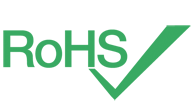Are your plain bearings compliant with RoHS, and what is RoHS anyway?
The key word “RoHS” is based on EU directive 2002/95/EU (“RoHS 1”) which was replaced on 3 January 2013 by EU Directive 2011/65/EU (“RoHS 2”).
The Directive regulates the restriction of undesirable ingredients in electrical and electronic equipment placed on the EU market. The abbreviation RoHS stands for “Restriction of (the use of certain) Hazardous Substances”.
Since many materials and products cannot be technically completely eliminated, concrete limits have been defined.
Affected are the substances commonly used in electronics such as lead, mercury, cadmium, hexavalent chromium, polybrominated biphenyls (PBB) and diphenyl ethers (PBDE). Application examples include the use of lead during soldering or as part of composite metal bearings and the use of PBB as a flame retardant. These substances also occur in numerous metallic alloys.
As you can see by taking a look at the substances and also from these application examples, these substances do not play any role in thermoplastic compounds such as our iglidur materials. Thus, the ingredients of our iglidur materials meet the requirements of Directive 2011/65/EU (RoHS 2). Appropriate explicit confirmations will be sent upon request.Contact

